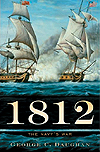 1812: The Navy’s War, by George C. Daughan, Basic Books, New York, 2011, $32.50
1812: The Navy’s War, by George C. Daughan, Basic Books, New York, 2011, $32.50
On June 26, 1812, President James Madison signed a declaration of war against the most powerful maritime nation in the world: Great Britain. Though justified by the Royal Navy’s impressment of American sailors, Britain’s violation of American sovereignty at sea and perceived involvement by British agents in Indian attacks along the western frontier, the declaration caught the United States unprepared for war. Daughan unravels the story of a nation that, without allies, sundered by partisan politics and sporting a military establishment that barely qualified as third-rate, managed to hold its own against the greatest power of the day.
This finely researched volume is a sequel to (or continuation of) Daughan’s award-winning If By Sea: The Forging of the American Navy—From the Revolution to the War of 1812. From the poorly conducted chase of HMS Belvidera by Commodore John Rodgers’ squadron in June 1812 to the capture of HMS Penguin by USS Hornet in March 1815, the author traces the rise of the U.S. Navy after its near dissolution following the American Revolution. He concludes with a brief examination of Commodore Stephen Decatur’s whirlwind campaign in late 1815 against the Barbary pirates, a success clearly enabled by the United States’ victory in the War of 1812.
Complementing the well-written and exciting narratives of naval action are concise analyses of the Americans’ abortive land campaigns along the Canadian border (necessary toward a full understanding of the conflict along the Great Lakes), the burning of Washington and the final redemption of the U.S. military at New Orleans. Daughan also spends some words on politics and diplomacy. Lacking, however, is adequate treatment of the private navy in which Madison placed his faith. Those bold privateers contributed at least as much to the war as did the regular service.
Though Daughan offers nothing new to the scholarship of the War of 1812, readers are unlikely to find a more engaging or stirring recounting of the conflict and its place in the rebirth of the U.S. Navy.
—Wade G. Dudley




